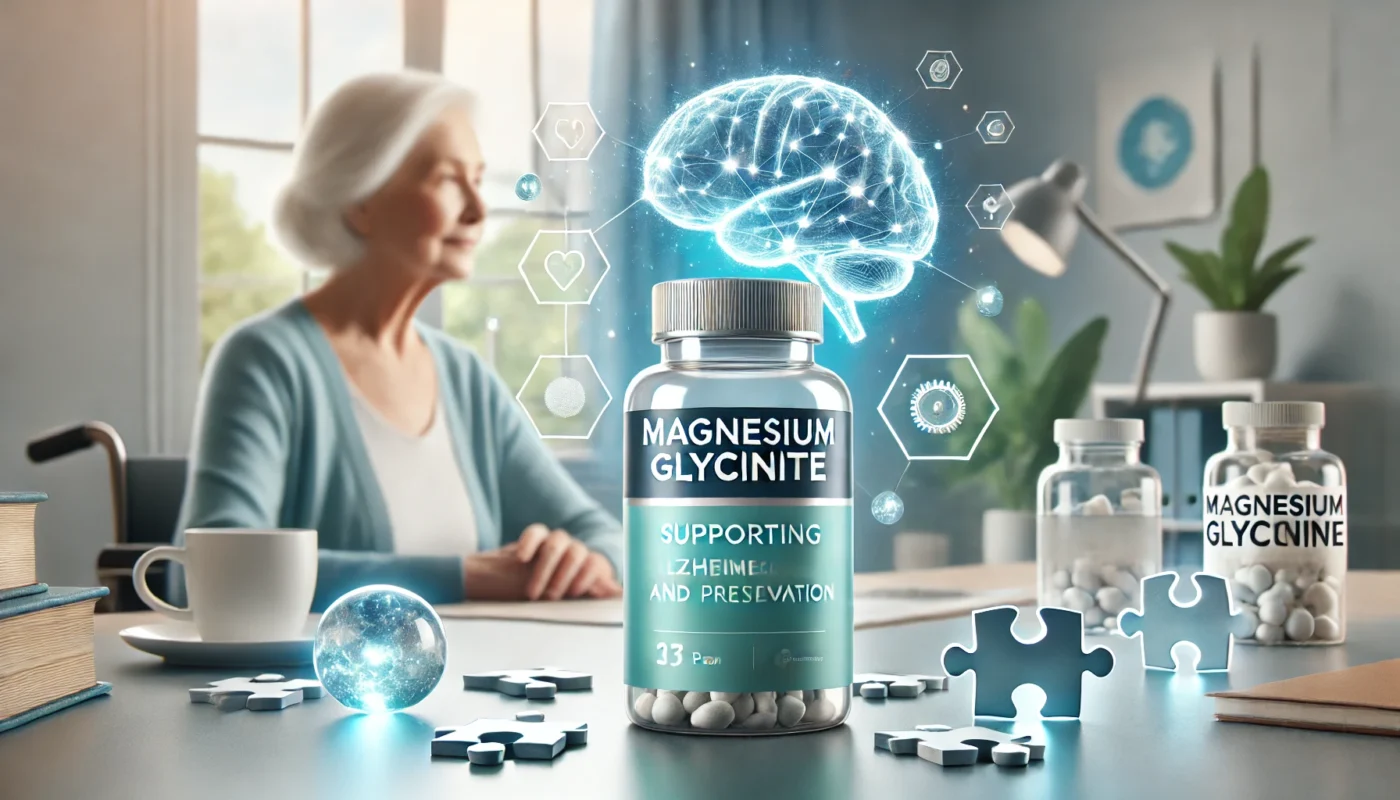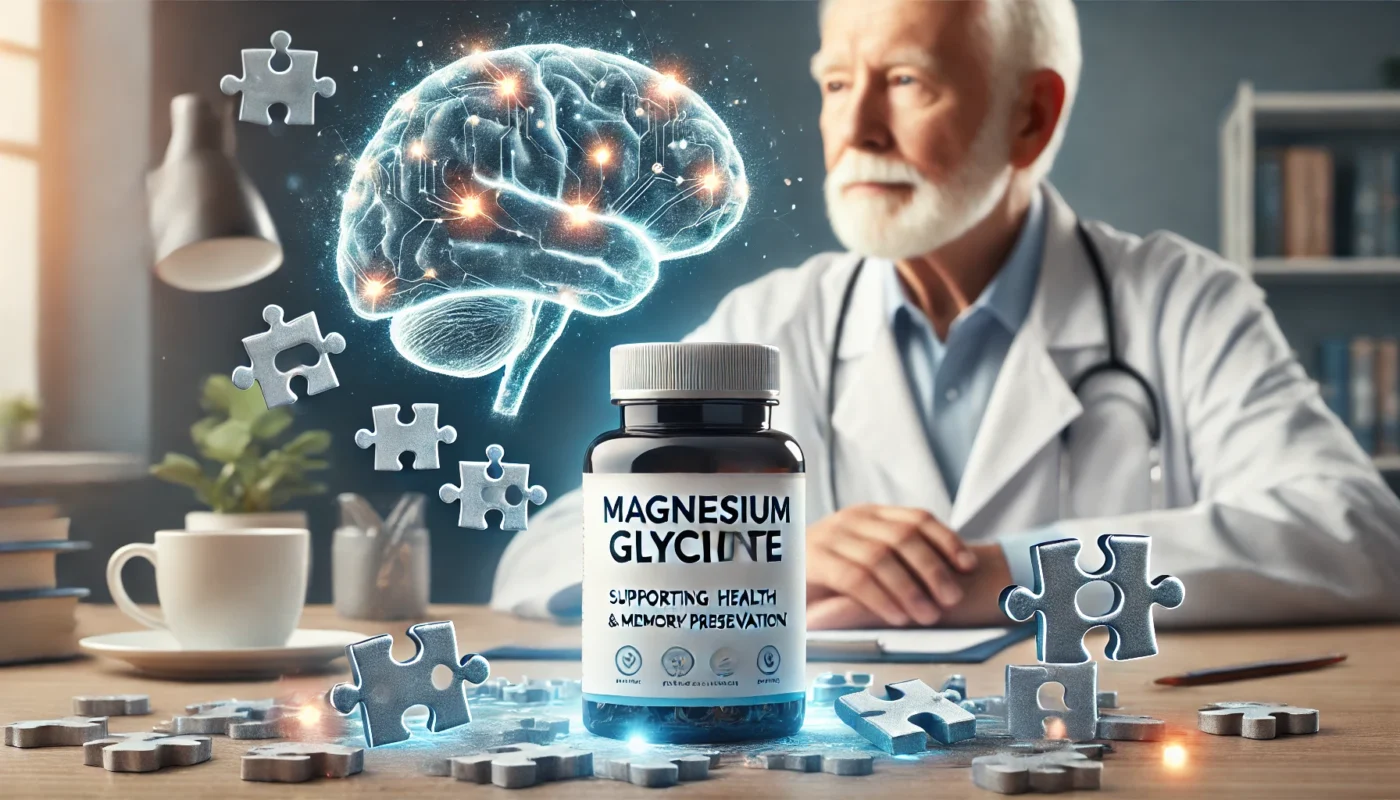Alzheimer’s disease, the most common form of dementia, affects millions worldwide, with no definitive cure currently available. As the prevalence of this neurodegenerative disorder continues to rise, researchers are increasingly focusing on preventive strategies, including the role of essential nutrients in brain health. Among these, magnesium has emerged as a promising candidate for its potential protective effects against Alzheimer’s disease. In particular, magnesium glycinate—a highly bioavailable form of magnesium—has garnered attention for its role in maintaining cognitive health. This article reviews the latest research on magnesium glycinate and its potential to mitigate the risk of Alzheimer’s disease.
You May Also Like:
Magnesium Glycinate and Cognitive Performance: Unlocking Your Brain’s Potential
Magnesium Glycinate and Brain Plasticity: Enhancing Cognitive Resilience
Understanding Alzheimer’s Disease: A Brief Overview
Alzheimer’s disease is characterized by progressive memory loss, cognitive decline, and behavioral changes. The hallmark features of the disease include:
- Amyloid Plaques: Accumulation of beta-amyloid protein fragments between neurons, disrupting cell function.
- Neurofibrillary Tangles: Clumps of tau protein that impair nutrient transport within brain cells.
- Neuroinflammation: Chronic inflammation that exacerbates neuronal damage.
- Oxidative Stress: Excessive free radicals damage brain cells, contributing to cognitive decline.
The Importance of Magnesium in Brain Health
Magnesium is an essential mineral involved in over 300 enzymatic processes in the body, many of which are crucial for brain function. Key roles of magnesium in cognitive health include:
- Regulating Neurotransmitters: Magnesium modulates glutamate and GABA, which influence learning, memory, and relaxation.
- Reducing Neuroinflammation: Magnesium helps lower levels of inflammatory cytokines in the brain.
- Protecting Against Oxidative Stress: Magnesium supports antioxidant defenses, reducing free radical damage.
- Maintaining Synaptic Plasticity: Adequate magnesium levels are essential for synaptic connections, which underlie memory and learning.

What Makes Magnesium Glycinate Unique?
Magnesium glycinate is a chelated form of magnesium, where magnesium is bound to glycine, an amino acid with calming properties. This formulation offers several advantages over other magnesium supplements:
- Enhanced Bioavailability: Magnesium glycinate is more easily absorbed and retained by the body, ensuring that adequate magnesium reaches the brain.
- Gentle on Digestion: Unlike magnesium oxide or citrate, magnesium glycinate is less likely to cause gastrointestinal distress.
- Neuroprotective Benefits of Glycine: Glycine itself supports neurotransmitter balance and has anti-inflammatory properties, complementing magnesium’s role in brain health.
Research on Magnesium and Alzheimer’s Disease Prevention
1. Magnesium Levels and Cognitive Decline
Numerous studies have linked magnesium deficiency to an increased risk of cognitive impairment and Alzheimer’s disease. A 2015 study published in Neurology found that individuals with lower serum magnesium levels had a significantly higher risk of developing dementia over a follow-up period of eight years. This highlights the importance of maintaining adequate magnesium levels for long-term brain health.
2. Amyloid Plaque Reduction
Magnesium supplementation has been shown to influence amyloid-beta dynamics. A study in The Journal of Alzheimer’s Disease (2016) demonstrated that magnesium improved amyloid clearance mechanisms in animal models, reducing plaque deposition in the brain. These findings suggest that magnesium may directly target one of the pathological drivers of Alzheimer’s disease.
3. Neuroinflammation Control
Chronic inflammation in the brain plays a central role in Alzheimer’s progression. Research in Frontiers in Aging Neuroscience (2018) found that magnesium supplementation decreased levels of pro-inflammatory cytokines, such as IL-6 and TNF-alpha, in both animal and human models. Magnesium glycinate’s high bioavailability ensures that magnesium can cross the blood-brain barrier effectively, providing direct anti-inflammatory benefits to neural tissues.
4. Synaptic Plasticity and Memory Enhancement
Magnesium promotes synaptic plasticity, the brain’s ability to adapt and form new connections. A study published in Neuron (2010) found that magnesium supplementation enhanced synaptic density in the hippocampus, a region critical for memory formation, in animal models. Improved synaptic function has been associated with better memory retention and learning capabilities, both of which are impaired in Alzheimer’s patients.
5. Oxidative Stress Mitigation
Oxidative stress contributes to neuronal damage in Alzheimer’s disease. Magnesium’s role in supporting antioxidant enzymes, such as superoxide dismutase (SOD), has been documented in multiple studies. A 2020 clinical trial in Nutrients showed that magnesium supplementation reduced oxidative markers in elderly participants with mild cognitive impairment, suggesting its potential to slow Alzheimer’s progression in its early stages.

Magnesium Glycinate vs. Other Forms of Magnesium
While all forms of magnesium offer health benefits, magnesium glycinate is particularly suited for brain health due to:
- Higher Absorption: Its chelated structure enhances absorption compared to magnesium oxide or sulfate.
- Glycine Synergy: Glycine enhances magnesium’s calming effects on the brain and reduces neural excitability.
- Long-Term Tolerability: Magnesium glycinate is less likely to cause side effects, making it suitable for extended use in preventive care.
Practical Applications: How to Use Magnesium Glycinate for Cognitive Health
Dosage Recommendations
The recommended daily allowance (RDA) for magnesium is 310–420 mg for adults, depending on age and gender. For those considering magnesium glycinate for Alzheimer’s prevention, typical doses range from 200–400 mg of elemental magnesium daily. Always consult a healthcare provider to determine the appropriate dosage.
Timing and Administration
- Evening Use: Magnesium glycinate’s calming effects make it ideal for nighttime use, improving sleep quality—a key factor in cognitive health.
- With Meals: Taking magnesium glycinate with food enhances absorption and minimizes potential gastrointestinal discomfort.
Combining with Other Nutrients
Magnesium glycinate works synergistically with other nutrients to maximize its neuroprotective effects:
- Vitamin D: Enhances magnesium absorption and supports brain health.
- Omega-3 Fatty Acids: Reduces inflammation and supports neural integrity.
- B Vitamins: Essential for energy metabolism and reducing homocysteine levels, a risk factor for Alzheimer’s.

Limitations and Future Directions
While current evidence supports magnesium’s role in brain health, research specifically on magnesium glycinate and Alzheimer’s disease remains limited. Future studies should focus on:
- Long-Term Effects: Investigating whether sustained magnesium glycinate supplementation can prevent or delay Alzheimer’s onset.
- Human Trials: Conducting large-scale clinical trials to confirm findings from animal studies.
- Combination Therapies: Exploring how magnesium glycinate interacts with other preventive strategies, such as exercise and cognitive training.
Conclusion
Magnesium glycinate offers a promising avenue for Alzheimer’s prevention, with its ability to reduce neuroinflammation, enhance synaptic plasticity, mitigate oxidative stress, and promote overall brain health. Its high bioavailability and gentle nature make it a superior choice for long-term supplementation. While more research is needed to establish its definitive role in preventing Alzheimer’s, existing evidence underscores the importance of magnesium as a cornerstone of cognitive health. For those looking to support their brain health proactively, magnesium glycinate is a scientifically backed option worth considering.

References
- Magnesium and aging. Retrieved from: https://pubmed.ncbi.nlm.nih.gov/20388094/
- Magnesium in Aging, Health and Diseases. Retrieved from: https://www.mdpi.com/2072-6643/13/2/463
- Enhancement of Learning and Memory by Elevating Brain Magnesium. Retrieved from: https://www.sciencedirect.com/science/article/pii/S0896627309010447
- The Effects of Magnesium Supplementation on Subjective Anxiety and Stress-A Systematic Review. Retrieved from: https://pubmed.ncbi.nlm.nih.gov/28445426/
- Magnesium in the Central Nervous System. Retrieved from: https://www.ncbi.nlm.nih.gov/books/NBK507256/
- Interleukin-6, C-Reactive Protein, Tumor Necrosis Factor-alpha as Predictors of Mortality in Frail, Community-Living Elderly Individuals. Retrieved from: https://pmc.ncbi.nlm.nih.gov/articles/PMC4321727/
- The effect of magnesium supplementation on primary insomnia in elderly: A double-blind placebo-controlled clinical trial. Retrieved from: https://pubmed.ncbi.nlm.nih.gov/23853635/
Important Note: The information contained in this article is for general informational purposes only, and should not be construed as health or medical advice, nor is it intended to diagnose, prevent, treat, or cure any disease or health condition. Before embarking on any diet, fitness regimen, or program of nutritional supplementation, it is advisable to consult your healthcare professional in order to determine its safety and probable efficacy in terms of your individual state of health.
Regarding Nutritional Supplements Or Other Non-Prescription Health Products: If any nutritional supplements or other non-prescription health products are mentioned in the foregoing article, any claims or statements made about them have not been evaluated by the U.S. Food and Drug Administration, and such nutritional supplements or other health products are not intended to diagnose, treat, cure, or prevent any disease.

